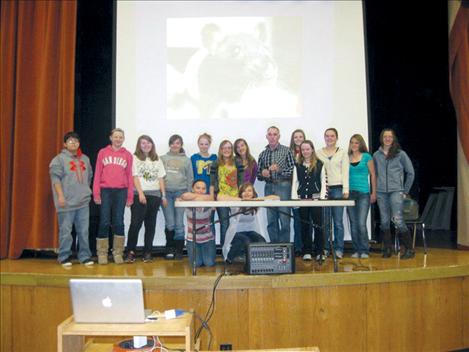Scientist whistleblower shares story with students
Hey savvy news reader! Thanks for choosing local.
You are now reading
1 of 3 free articles.
Mission Valley school children had the opportunity to hear one of the main “whistle blowers” against the major tobacco companies tell his story of secret laboratory studies, being fired, and subsequently testifying before Congress that led to the Master Settlement Agreement. Money from the tobacco companies to settle this lawsuit back in 1998 is what led to states setting up their own tobacco prevention programs. Ironically, funding from this lawsuit established the tobacco prevention programs of Lake County and the Confederated Salish and Kootenai Tribes and is ultimately what brought Dr. DeNoble to this area several weeks ago.
Dr. Victor DeNoble is a research scientist who was hired back in the 1980s by Philip Morris Tobacco Company to develop a safer cigarette; that is, one that does not carry all the negative cardiovascular effects caused by nicotine, like constricting of the blood vessels which results in the heart having to beat faster. After receiving his doctorate in experimental psychology, DeNoble conducted post-doctoral research in behavioral pharmacology at two different institutions. This is why he was hired by Philip Morris in 1980 to develop a substitute for nicotine that retained the reinforcing effect on the central nervous system (its addictive qualities) but eliminated nicotine’s adverse effects on other parts of the body, like the heart and blood vessels. After all, it is the effects of nicotine on the cardiovascular system that keeps smoking tobacco at the top of the list for preventable deaths annually in the U.S.
While school children may often hear talks on drug and alcohol prevention, they may not hear about the effects of each of these drugs on our body’s biological systems. Not only did students get to hear how mice pressed levers to self-deliver nicotine doses on an ever-increasing daily schedule, but they also got to see a monkey’s brain that had been physically changed by nicotine use. They could not see these changes, but Dr. DeNoble explained how the brain actually grows more nicotinic receptors in order to receive increasing amounts of the drug. This is why tobacco companies control the exact amount of nicotine that goes into each pack of cigarettes. When the ramifications of Dr. DeNoble’s experiments became clear to the tobacco company executives, they fired him and prevented him from sharing the results of his research. Even though he had found that safer cigarette, he had also revealed the highly addictive nature of the drug nicotine, something the tobacco companies had been denying for decades.
From Arlee to Polson, mostly junior high students learned how he and his research colleges had been fired; how he had the where-with-all to take the results of his research with him; and how many years later, President Clinton called him at home and asked him if this research was true, and if so, would he come to Washington and testify before Congress? Of course he did, and in 1998, he became one of the most important whistleblowers released from his secrecy agreement with Philip Morris, where he stood before Congress and nine tobacco executives to explain what exactly his research revealed, why he was fired, and ultimately the suppression of scientific research that could have prevented an untold number of tobacco-related illnesses and deaths.
All nine tobacco executives were found to be “racketeers;” hence the lawsuit (MSA) that led to states setting up tobacco prevention programs to counter the aggressive marketing practices of these large companies, which are often aimed at children. His congressional testimony was the cornerstone for sweeping changes in public policy regarding tobacco use, the national tobacco settlement and the events leading up to President Obama’s signing into law the Family Smoking, Prevention and Tobacco Control Act in 2009. Dr. DeNoble devotes all of his time now speaking to a wide range of audiences, mostly school aged children, about his experience in the tobacco industry and most importantly, he educates about the science of drug addiction.
Dennis Johnson, tobacco prevention coordinator for Lake County’s Tobacco Prevention Program, instigated Dr. DeNoble’s visit to the Mission Valley and had this to say about Victor’s visit: “I hope his three days in Lake County, where he presented to over 2,000 students, will help most of them make the good decision to avoid drug use.”
















